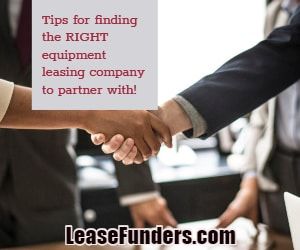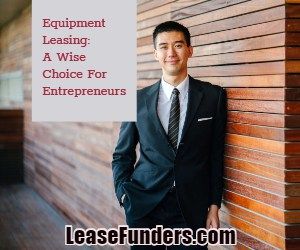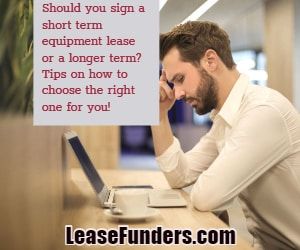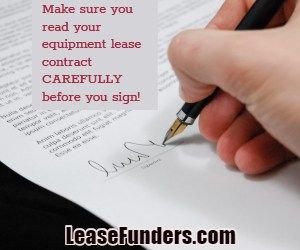According to the Equipment Leasing and finance organization (https://www.elfaonline.org/about/industry-overview), Seventy-eight percent of U.S. companies use some form of financing when acquiring equipment, including loans, leases, and lines of credit (excluding credit cards).
There are definite advantages in leasing business equipment and with the right leasing partner, a business owner will surely enjoy the benefits.
Using equipment leasing to finance your business equipment
Are you ready to acquire a lease? If yes, consider the following equipment lease tips on how you can make the most out of leasing:
1. Start with the right leasing partner. There are many equipment financing
There are also companies that will only finance a certain type of business. For example, an established business with good credit.
If you know that you have “special circumstances”. Look for a financing partner with experience in working with your type of business or credit type.
If you have bad credit, you want to make sure you work with a lender with experience in financing bad credit. If you are a startup business, you want to make sure that you meet the lenders time in business requirements BEFORE you apply.
2. Choose a program that fits your business. Before signing up for a lease, it’s important to choose a program that’s right for your business. Business equipment lease financing can be categorized in two basic programs: finance and operating leases.

On the other hand, an operating lease is ideal for types of equipment that needs to be replaced or upgraded after a short term period. When the lease term ends, the lessee can simply return the equipment to the leasing company without further obligations.
3. Check the approval requirements. The specific requirements may vary from one leasing company to another. The list of requirements may also depend on the business you own and the lease program you are applying for. For example, if you own a new or start-up business, you should look for a program specially created for your business type and see if you meet the lessor’s criteria of eligibility.
About 18 years ago I worked for a company in their commercial credit department. I would look over applications to approve them for our in house financing.
At first, I was surprised when a business that didn’t meet even one of our minimum requirements would apply. But over time I learned that alot of people don’t bother to read the requirements for approval.
4. Start with a short term lease. A short term lease is recommended because 
Why?
Because both of these business types are considered high risk. So the rate is higher than what an established business or a business owner with good credit would get.
Most business owners don’t have the time to wait for their credit to improve. They need financing now. So its a better business decision to take a high-interest loan or lease for a short time. Then to take that same lease / loan for a longer term.
5. Building Business Credit.

Does the leasing company report to a business credit bureau like Dun & Bradstreet? Acquiring an equipment lease is also a good way to build up your business credit history and credit score but if your lessor does not report to the bureaus, D&B will not be able to monitor your payments. Of course, you should strictly submit your monthly lease payments on time to build and maintain a solid business credit standing.
6. Read the fine print. Make sure you understand the lease contract before you sign it. 
Make sure the rate and term are the same on the contract as it was given to you in the proposal. And finally, watch out for Evergreen Clauses.
An evergreen clause basically means that your lease will automatically extend unless you cancel it by a specific date. Here at Leasefunders.com we never have contracts with an evergreen clause.
Taking the time to thoroughly read any contract before you sign it, is to your benefit. Pay close attention to any pre-payment penalties, clauses, fees, and of course the payoff.


